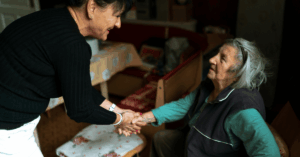A Caregivers Work
As a caregiver to a loved one with dementia, what does your schedule look like? Do you work, and have kids, as well as give care to your loved one? Do you have other relationships to manage? What are your daily commitments?
As a caregiver to a loved one with dementia, what are the duties you perform? Are these duties physically challenging? Do you have any help with everyday tasks? Do you know whom to turn to for an emergency? Are you able to communicate with your loved one?
If your answers paint a picture of a busy life of intense caregiving, with no time for your own needs. If you have no help for the caregiving you provide, be aware that caregiver stress won’t be far behind. The mental, emotional, physical, and spiritual health of a caregiver is tested every day. And without help and community support, caregiver burnout is a reality.
The Handbook for Caregivers put out by the Fraser Health Authority in BC, lists the common symptoms of caregiver burnout. Exhaustion or lack of energy; sleeplessness; irritability; lack of concentration; social withdrawal; anxiety; thoughts of “I just don’t care anymore,” and health problems.
The Importance Of Health
It is so important to plan for your own health when you’re caring for others. Be aware of your mental and emotional state. Make sure you are connecting socially with friends and family. Do activities on your own that interest you and be good to yourself (reward yourself with a spa massage or movie night), and exercise (take a dance class or go for a walk, or even do an exercise video if you can’t leave your home). Care for your spiritual self by doing yoga, reading, or praying. Make sure you are getting quality sleep and to do this, you need to shut down your mind at night (meditation before bed can help.)
Say “no” if you feel you can’t do something. The most helpful thing to do is join a support group. At a support group, you will be able to get relief by sharing your stories and connecting with others who may be going through the same situations as you, and you can get help from others who can empathize with you.
Here are some other supports for caregivers that may be of interest to you: Alzheimer’s Society of Canada: www.Alzheimer.ca and The Canadian Caregiver Coalition: www.ccc-ccan.ca.
We at Dementia Solutions can help you by offering caregiving tips and creative suggestions on ways to manage behaviours associated with dementia, so you can live a better less-stressed caregiver life.
Please feel free to contact us at: www.DementiaSolutions.ca or call 778-789-1496, for any further information you might need about caring for yourself and your loved one.
Karen 🙂
Karen Tyrell, CPCA, CDCP
Dementia Solutions


